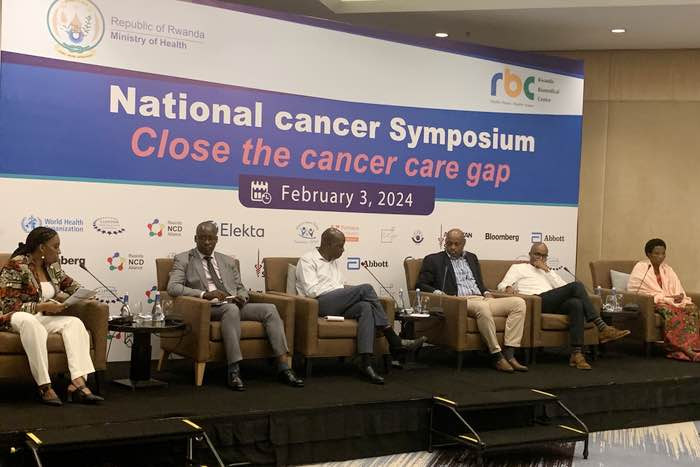
Panelists are discussing on challenges about cancers
Today the Ministry of Health through Rwanda Biomedical Centre celebrates the World Cancer Day themed as “Close the care gap in Rwanda” a day dedicated to raising awareness about cancer and encouraging its prevention, detection, and treatment.
Cancer affects millions of people worldwide, and it can be a devastating disease for both patients and their loved ones. Cancer is the second leading cause of morbidity and mortality worldwide, accounting for approximately 19.3 million new cases and 10 million cancer related deaths as estimated in 2020.
In Rwanda, Current estimates of cancer burden are 8, 835 new cancer cases and 7,662 deaths a year (Globocan 2018).The survival rate of patients diagnosed with cancers is appallingly low in the developing world, Rwanda included.
The Minister of Health, Dr. Nsanzimana Sabin urges more people to get cancer screening, “People should get regular check-ups and screenings, as early detection can often make a huge difference in the success of treatment and overall survival rates. I hope that more education and outreach efforts will be made to help people understand the signs and symptoms of cancer, as well as the various screening options available to them.”
The Government of Rwanda has made significant progress to reverse the burden of cancer in Rwanda. This is being achieved through improving awareness of the general population on prevention of cancer risk factors, scaling up cervical cancer screening and breast cancer early detection, upgrading diagnostic capacity as well as decentralization of palliative care services.
Despite these achievements, there is still poor awareness of the general population about cancer prevention, and control and late consultation where more than half consult health services at a late stage.
The celebration of the World Cancer day has been marked by different activities including awareness of General Population on cancer prevention using different communication channels, ward cancer day walk during car free day, servical cancer screening, and breast cancer early detection in 19 districts respectively Musanze, Gasabo, Nyarugenge, Kicukiro, Huye, Bugesera, Rusizi, Rwamagana, Burera, Kirehe, Kayonza and Gakenke; an international cancer symposium and dissemination of AVE study results during the symposium. (End)
